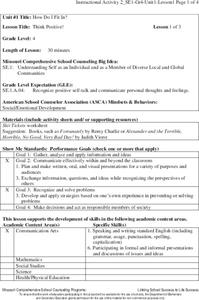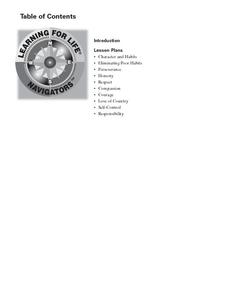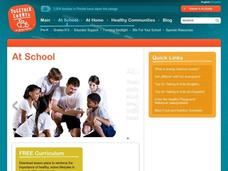Curated OER
Cinderella
Explore positive and negative character traits and universal themes in the story of Cinderella with primary learners. Story elements are reviewed and discussion questions are listed. Learners practice retelling the story and begin a...
Overcoming Obstacles
Having a Positive Attitude
Through discussion and reflection, scholars discover what it means to have a positive attitude, that an individual can choose to stay positive, and discuss the benefits of a positive attitude. Learners listen to negative scenarios to...
Curated OER
Character Traits Introductory Lesson
Students identify character traits. In this reading comprehension lesson, students read the story of Dr. Jekyll and Mr. Hyde and discuss the characters. Students identify positive and negative character traits from the story.
Missouri Department of Elementary
Goldilocks Revisited
After a read-aloud of the story Goldielocks and the Three Bears, scholars gather into small groups to answer a series of questions. Peers examine the idea of smart decisions and identify three feelings of characters alongside three...
Missouri Department of Elementary
An Apple a Day
Three apples—green, red, and rotten—exemplify character traits, negative and positive. Following a discussion about the classroom community, scholars complete an apple-themed worksheet that challenges them to read each trait, color it...
Missouri Department of Elementary
Think Positive!
Following an attention-grabbing read-aloud, scholars brainstorm ways they can change negative thoughts into positive thoughts. Small groups plan and perform a skit that showcases one of the new ideas to uplift one's feelings....
Missouri Department of Elementary
I’m Thumbody!
Positive and negative thinking is the focus of a lesson that boost self-awareness. Beginning with a whole-class discussion, scholars brainstorm what positive thinking looks and sounds like then compares and contrast the two types of...
Curated OER
The Right Character Produces Positive Outcomes
Students explore the meaning of character and why positive character is important. They explain the difference between character and personality. Students determine the difference between right and wrong character. They explore the...
Curated OER
James and the Giant Peach Character Study
Every book has a few great characters, but James and the Giant Peach is the only one whose characters travel in a piece of fruit. The class creates T-charts for the main characters of the novel, while reading the book. They write actions...
Peaceful Solution Character Education
Self-Control Starts With You
How can negative thoughts affect your life? Learn about the ways you think about yourself can define your personality, and how self control can be the answer to higher self esteem.
Learning for Life
Character and Habits
Part of growing up is differentiating between good and bad habits; developing the positive and eliminating the negative. This resource on life skills can be adapted to almost any age group. Class members participate in multiple...
Curated OER
Language Arts: Character Analysis
Fourth graders identify the character traits of Peter in Tales of a Fourth Grade Nothing. They find quotations in the story that illlustrate the traits. Students use Kidspiration to write their reports on a template.
Curated OER
Analyzing Relationships
Young scholars explore relationships between story characters. In this story elements and reading comprehension lesson, students generate character traits of the characters in Bridge to Terabithia, by Katherine Paterson. Young scholars...
Curated OER
Getting along With Others
Learners examine character traits to find the most positive behaviors. In this getting along lesson, students identify behaviors that are beneficial to getting along. Learners evaluate their own behaviors and target three that could...
Talking with Trees
What is Responsibility?
Encourage responsible behavior with a worksheet that challenges scholars to read four scenarios, identify the level of responsibility, and brainstorm consequences of the actions taken.
Orange County Department of Education
Integrity and "Thank You, M'am"
Ninth graders explore the definition of integrity through a class discussion. They provide positive/negative examples from the story and their own experiences. Students determine character traits by analyzing the dialogue in a short...
Curated OER
Self-Control Starts With You
Students develop a definition for self-control and explore how practicing self-control can lead to other positive character traits. They read and discuss examples of student behaviors that exhibit self-control and those that don't.
Curated OER
Full Esteem Ahead
Young learners who feel good about themselves will fare better in the long run than those who do not have a high level of self-esteem. Introduce youngsters to what it means to like themselves. Discuss positive characteristics and...
Curated OER
The Crucible Essay Questions
In this literature worksheet, students respond to 9 short answer and essay questions about Arthur Miller's The Crucible. Students may also link to an online interactive quiz on the novel at the bottom of the page.
Curated OER
Do the Right Thing
Students define integrity and responsibility, then discuss the motto "Do the Right Thing." students participate in teacher-generated problems in small groups.





















